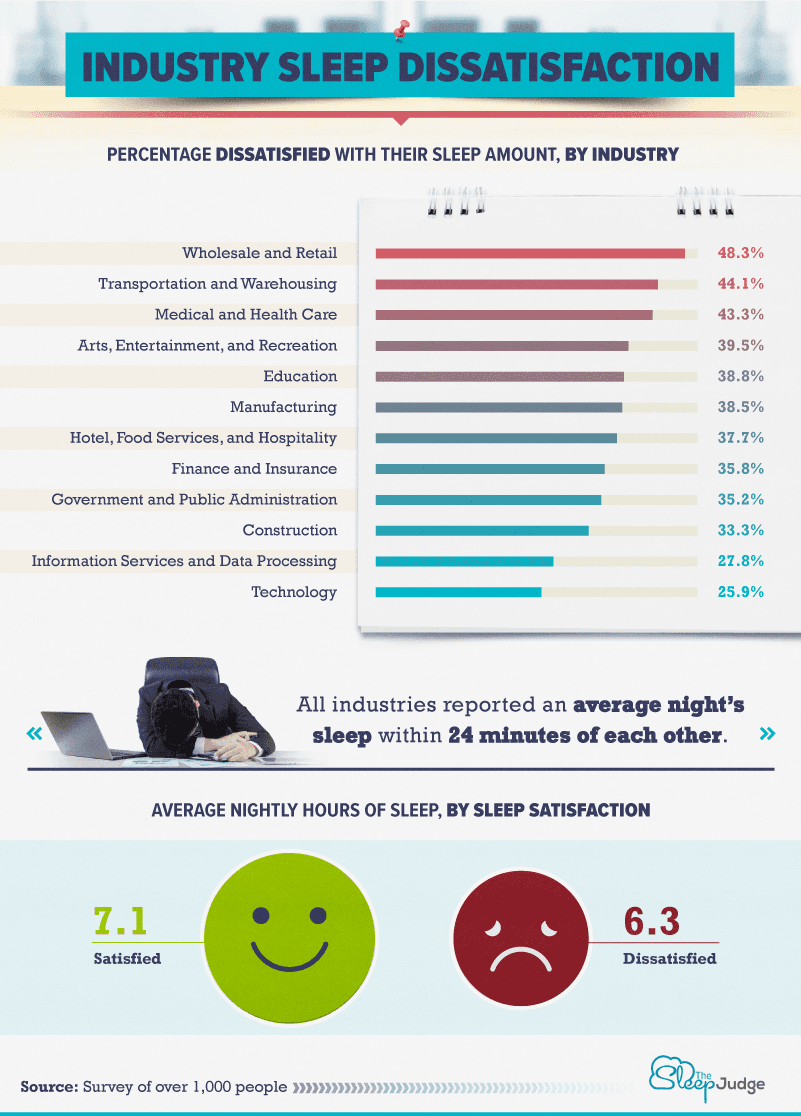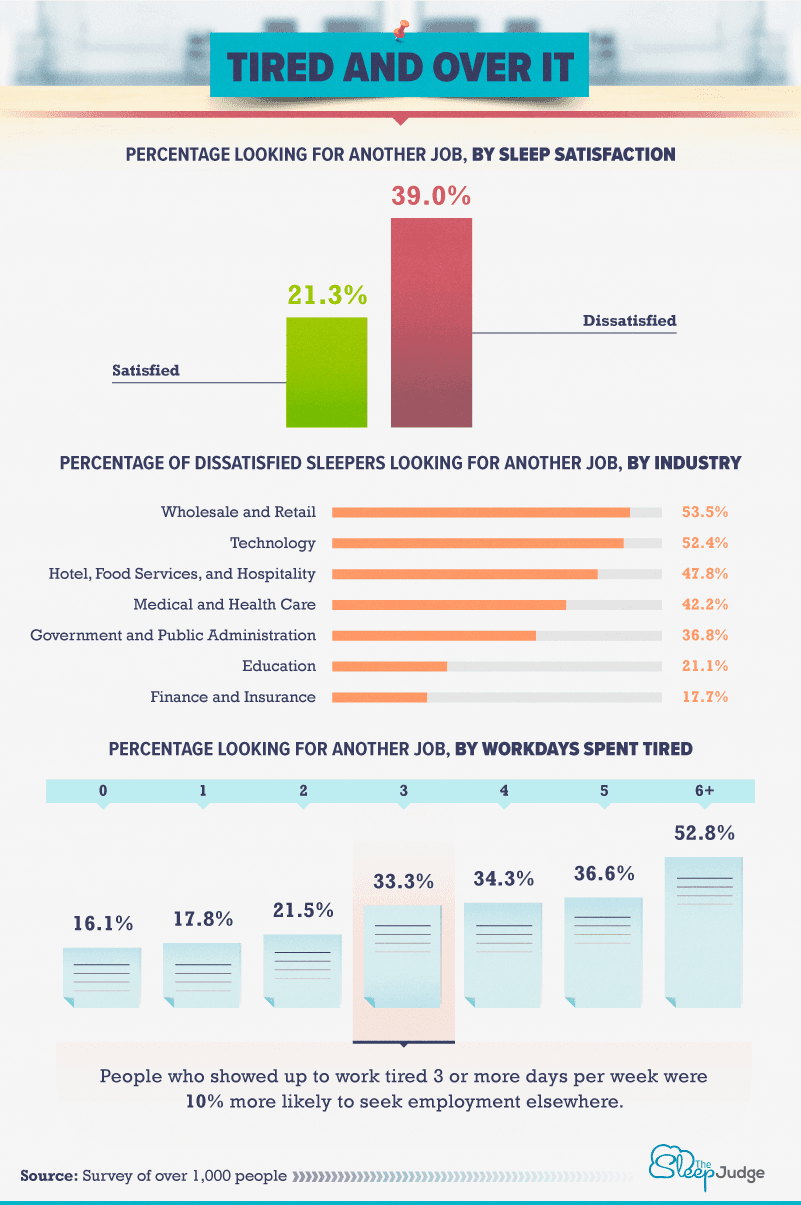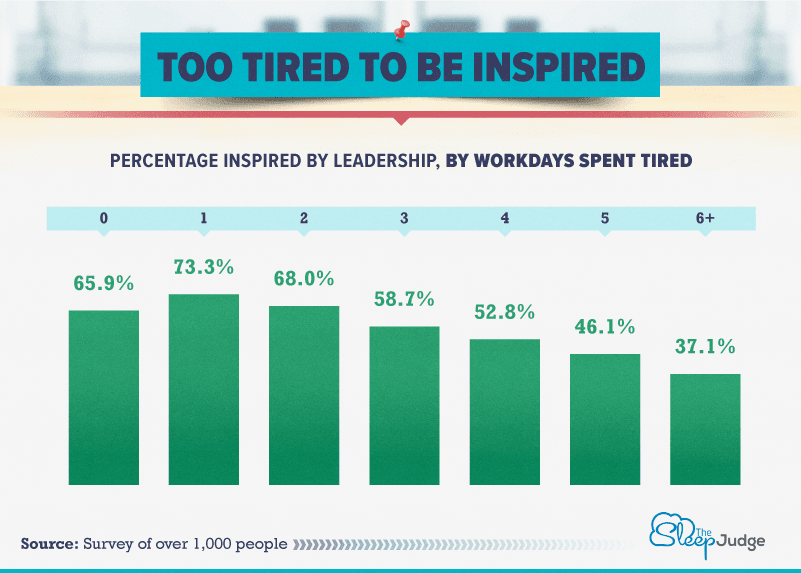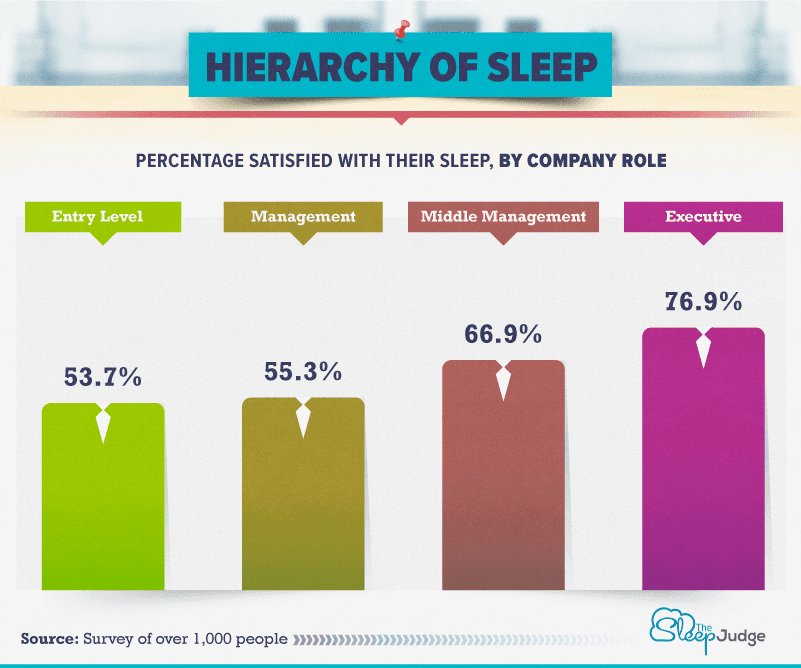The health ramifications of sleep deprivation are serious: Scientists suggest that skipping rest presents a range of medical risks, including heart disease and mental health disorders. But if consistent fatigue produces long-term health problems, more immediate impacts are visible in workplaces across the country. Research indicates that sleepy employees cost companies $411 billion annually in lost productivity – equivalent to nearly 3 percent of total GDP. Performance issues stemming from exhaustion have grown so severe that some companies have introduced sleep pods, encouraging workers to take naps when necessary.
We set out to study sleep and fatigue from the employee perspective, surveying over 1,000 individuals to see how rest affects job satisfaction and other key metrics in the workplace. Our findings reveal the industries in which sleep deprivation is most problematic and how a lack of rest might detract from company culture. Could more sleep dramatically improve employee attitudes and significantly reduce turnover? To learn how sleep deprivation causes and compounds the frustrations of American workers, keep reading.
Tired Trades
In some industries, such as wholesale and retail, more than 4 in 10 workers were dissatisfied with the amount of time they typically spent asleep. Moreover, dissatisfaction with sleep was particularly common in fields where fatigue has proven dangerous. In the transportation trade, in which 44 percent of workers were dissatisfied with the amount of sleep they received, truckers falling asleep at the wheel are a constant concern. Similarly, studies show that tired doctors are far more likely to harm their patients accidentally. Around 43 percent of the medical workers surveyed were dissatisfied with their amount of sleep.
Interestingly, however, average sleep amounts didn’t differ much across industries, although rates of dissatisfaction did. Moreover, individuals who were satisfied with their sleep slept just 48 minutes more per night, on average, than those who were dissatisfied. These findings call attention to an important consideration: When it comes to assessing sleep, quality matters as much as quantity. Additionally, some fields are very physically demanding. What may feel like sufficient rest to an office worker may not satisfy someone who stands for hours on end on a sales floor or in a factory.
Sleep Troubles and Turnover
Professionals who were dissatisfied with their sleep were far more likely to be mulling a professional move, with nearly 4 in 10 looking for another job. This trend was most pronounced in the retail and technology sectors, where more than half of dissatisfied sleepers were looking for a new job. Because turnover is a consistent challenge among major retailers, perhaps some corporations would do well to consider how employee fatigue may drive this trend. Tech companies also have strong reasons to address employee sleep issues, as burnout becomes an increasingly pressing challenge across the industry.
In other sectors, however, dissatisfied sleepers were mostly content to stay put in their current positions. Fewer than 1 in 4 dissatisfied sleepers working in education or finance and insurance were looking for a new job. No matter your chosen field, however, having a couple of days off each week may be the strongest driver of employee retention. Among those who spent six or more workdays feeling tired each week, over half were looking for different work. That should be a sobering thought for many companies, especially as most Americans now report that their employers expect them to work some weekends.
Lacking Sleep, Dismissing Leadership
There’s another reason executives may want more well-rested workers: They’re more likely to respond positively to company leaders. Indeed, among employees who reported feeling tired on just one or two days each week, more than two-thirds said their organization’s leaders inspired them. As workers reported feeling tired more frequently, they were significantly less likely to find their leaders inspiring. In fact, fewer than half of workers tired on 5 or more workdays were inspired by their company leadership.
This trend is particularly concerning in an era of suspicion of corporate leadership: One recent study found that 63 percent of workers distrust their company’s chief executive. After all, if you’re constantly exhausted and see top brass as less than credible, no leadership style is likely to inspire.
Getting Rest, by Professional Role
Our findings indicate a correlation between sleep satisfaction and career advancement: At each successive level of leadership, a greater percentage of respondents were content with the rest they got. In fact, more than three-quarters of executives were satisfied with their sleep, whereas less than 54 percent of entry-level employees said the same. Two-thirds of middle managers were happy with their rest as well. These findings seem to contradict the notion that working long hours is key to climbing the corporate ladder. If people in high-ranking positions shoulder more responsibilities than the average employee, they don’t seem to compromise sleep to do so.
Perhaps executives are more insulated from stressors that detract from sleep, such as financial insecurity. Or they may have support staff to handle time-consuming tasks that keep other workers awake, like answering emails or preparing for meetings. Still, researchers hypothesize another explanation: Well-rested individuals prove to be more effective leaders, and their success in managing others leads to promotions. Accordingly, the most powerful way to advance one’s career may be to head to bed earlier than the competition – and maintain that habit in future roles as well.
Sleeping for Success
While our data suggest that no industry is entirely spared from sleep troubles, certain trades seem particularly prone to foregoing needed rest. The resulting impacts on morale are striking, indicating that many companies would do well to support better sleep among their employees. For some businesses, doing so may mean innovative approaches like sleep pods and generous time-off policies. For most companies, however, the shift in perspective may prove far simpler. While asking team members to work long hours may be tempting in the present, doing so may prove counterproductive over time.
Regardless of employer policies, individual professionals can take meaningful steps to protect their own rest. One option is putting aside devices before bed (no dashing off work emails as you attempt to doze off). Other possibilities include limiting caffeine and getting regular exercise. The next time you catch yourself yawning in your morning meeting, ask yourself what you’re willing to do to support your own sleep. No matter where you work, healthy choices can help.
Methodology
To collect these data, we ran a survey of 1,011 people using Amazon’s Mechanical Turk. Respondents were rejected from the survey if they didn’t answer that they worked either part or full time at a physical location. 545 men and 466 women completed our survey, and the average age of our respondents was 35 with a standard deviation of 10. These data were not weighted, and the results of our study should be understood as purely exploratory.
Fair Use Statement
We hope you’ll use this project to encourage your colleagues to get more rest – even share it with your boss if you’re feeling bold! In that spirit, you’re free to use our information and graphics for any noncommercial purpose. If you do share our work, please link back to this page to provide use credit.




